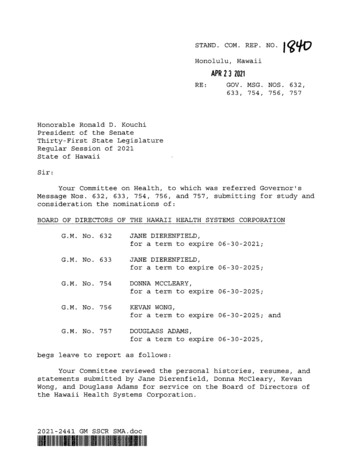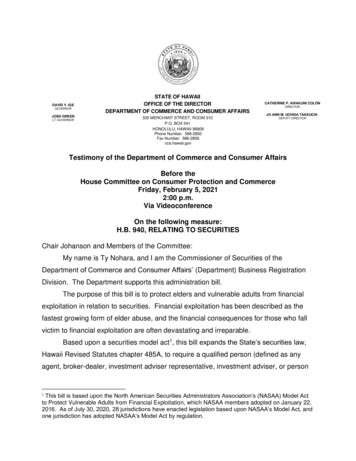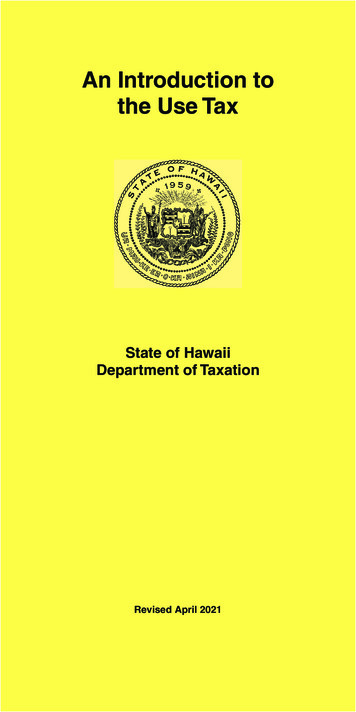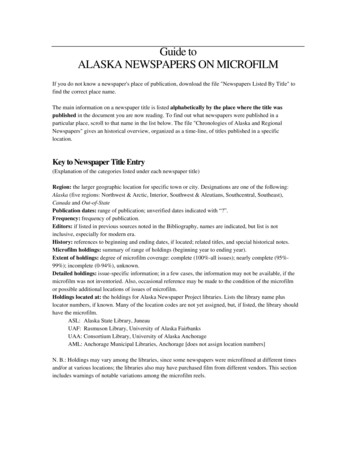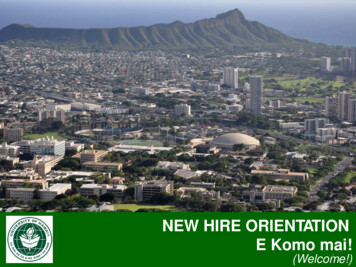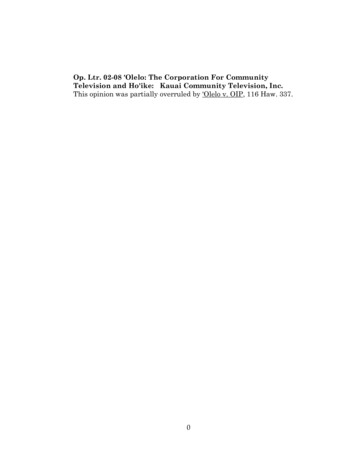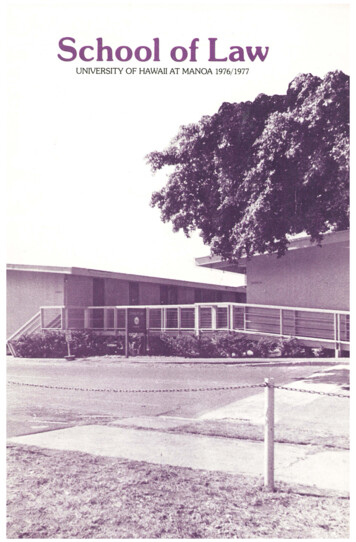
Transcription
IwUNIVERSITY OF HAWAII AT MANOA 1976/1977
1976/77School of LawUniversity of Hawaiiat ManoaFrom the Dean's Office .The School of Law graduated its first class in May, 1976.These graduates are nowproviding legal services in a variety of roles. The School has thus completed its firststeps into full maturity; the pioneer days are over. In the future the people of Hawaii,asis their right, will be expecting a record of sustained accomplishment.The enthusiasm, energy and sacrifices of many people were required to bring theLaw School to this fruitfulstage. With the assistance of many outside benefactors, theinitial deans, faculty, staff and students have succeeded in shaping the essentialframework of a full and imaginative program of legal instruction. More recently, timelyand generous action by University and State authorities permitted a major expansionand renovation of the School's temporary physical plant, thus dispellinga cloud whichhad hung over our continued provisional accreditation. A thorough dean searchhas been concluded with the appointment (effective 1/1/77) of Professor CliffThompson of Southern Methodist Law School. Finally, the Regents of the University have committed themselves to the task of providing permanent quarters forthe School by 1980.If all of these portents augur favorably, it can only be due to the continued kokua ofmany people-friends of the School throughout the community. Their assistance overthe past three years has enabled those of us directly connected with the School tomove toward a fuller understanding and realization of the special potential this institution represents to the people of the State of Hawaii. As we continue in that task weextend a special welcome to our new faculty and student colleagues and to our newgraduates, now in the role of alumni. We point with some pride to the past and withmuch hope to the future. With the continued help of our friends and together with ournew colleagues, we are confident that we can make substantial additional contributions to the spirit and success of the School.A. JEROME DUPONTActing DeanSeptember 14, 1976
ContentsUNIVERSITY OF HAWAII AT MANOALAW SCHOOL CALENDAR 1976-77Fall Semester 1976Registration . . . . . . . . . . . . . . . . . . . . . . . . . . . . . . . . . . . . . . . . . . . . . . . . August 25-26Instruction beginsSeptember 7Last day to registerSeptember 20Last day to withdraw from courses orregister for courses for creditSeptember 27Holiday: Discoverers' DayOctober 11Holiday: Veterans' DayNovember 11Last day for Records Office to receive"I" removal grades from instructors. . . . . . . . . . . . . . . . . . . . . . . . November 24Holiday: Thanksgiving Day . . . . . . . . . . . . . . . . . . . . . . . . . . . . . . . . . . . November 25Last day of instruction . . . . . . . . . . . . . . . . . . . . . . . . . . . . . . . . . . . . . . . December 10Study period"December 11-16Final examinations. . . . . . . . . . . . . . . . . . . . . . . . . . . . December 17-23Semester break begins" December 24Spring Semester 1977RegistrationJanuary 12-13Instruction begins,"January 24Last day to registerFebruary 4Last day to file diploma applicationsFebruary 7Last day to withdraw from courses orregister for courses for creditFebruary 4Holiday: Presidents' DayFebruary 21Holiday: Kuhio DayMarch 26Last day for Records Office to receive"I" removal·grades from instructors. . . . . . . . . . . . . . . . . . . . . . . . . . . . . . . April 1Spring recess. . . . . . . . . . . . . . . . . . . . . . . . . . . . . . . . . . . . . . . . . . . . . . . . . . . April 4-9Last day of instructionMay 6Study period and final examinationsMay 7-21CommencementMay 22LAW SCHOOL ACADEMIC CALENDAR, 1976-77 2UNIVERSITY ADMINISTRATION 4SCHOOL OF LAW ADMINISTRATIVE OFFICERS, FACULTY, LIBRARIANSAND STAFF 4MEMORIAM 10GENERAL INFORMATION 11The University of Hawaii, .11History of the Law School, 11Physical Facilities of the Law School, 12Libraries, 12Profile of the Law Student Body, 12Accreditation of the Law School, 12Tuition and Application Fees, 13Refunds, 13Financial Aid, 14Part-Time Employment, 14Housing, 14Student Health Service, 15Counseling and Testing Center, 15Food Services, 15Placement Services, 15Student Regulations, 16Change of Address, 16Student Conduct, 16Financial Obligations, 16Parking and Traffic, 17Admission to Practice Law, 17Liaison with the Hawaii Bar, 17ACADEMIC INFORMATION 18JURIS DOCTOR PROGRAM 18Objectives, Methods, and Rationale, 18Curriculum and Courses, 21General Electives-Post First-Year, 23Special Projects, 24Courses Outside the Law School, 24Description of Courses, Seminars, Workshops, 25GRADES AND DEGREE REQUIREMENTS 34Grades, 34Degree Requirements, 34PRE-ADMISSION TO LAW SCHOOL PROGRAM 35OTHER LAW SCHOOL PROGRAMS 35GOVERNANCE OF THE LAW SCHOOL 36ADMISSION REQUIREMENTS AND PROCEDURES 36PRE-LAW EDUCATION 37COMMUNITY LEGAL EDUCATION PROGRAMS 38THE LEGAL ASSISTANT PROGRAM 38RECENT GIFTS AND GRANTS TO THE LAW SCHOOL 3923
FACULTYFACULTYPERMANENT AND VISITING FACULTY*ADDISON M. BOWMANProfessor of LawAB., Dartmouth College, 1957LL.B., Dickinson School of Law, 1963LL.M., Georgetown University Law Center, 1%4Professor Bowman practiced law with the Legal Aid Agency (now Public Defender Service) forthe District of Columbia following his graduation from law school. He taught at GeorgetownUniversity Law Center from 1967 until 1975, and there directed theE. Barrett PrettymanProgram in Criminal Trial Advocacy and founded the Georgetown Criminal Justice Clinic.Professor Bowman has substantial criminal trial experience, and is a consultant in the matter ofpublic defender and clinical programs for the training of criminal trial advocates.THEODORE L BECKERVisiting Professor of LawFall Semester 1976B.A., Rutgers University, 1954LL.B., Rutgers University, 1956Ph.D., Northwestern University, 1964Professor Becker has been a member of the Political Science faculty at the University of Hawaiisince 1964. During this period he has been a visiting professor at several mainland universities,and in 1972-73 was Meyer Professor of Law at New York University. He has authored numerousarticles and books, including Comparative Judicial Politics (Rand McNally 1970),PoliticalTrials(Bobbs-Merrill1971), and Your Country, 'Tis of Thee: The Making of a Constitutional Revolution (Allynand Bacon, 1976).WILLIAMSON B.C. CHANGVisiting Assistant Professor of LawAB., Princeton University, 1972J.D., University of California, Berkeley, 1974Professor Chang, a native of Hawaiiwho received his secondary education here, graduated fromPrinceton in both international affairs and Asian studies, and his law teaching interests extend tothese fields as well as the fields of corporate taw and securities regulation. While at Boalt Hall,Professor Chang was an editor of the California Law Review, in which he has recently coauthored an article, and also worked with the Asian Law Caucus in Oakland. Followinggraduation, he served as Law Clerk to Judge Dick Yin Wong, United States District Court, District ofHawaii.KAREN CZAPANSKIYAssistant Professor of LawB.A, cum laude, University of California,Berkeley, 1969J.D., Georgetown University Law Center, 1973Professor Czapanskiy was the Case and Notes Editor of the Georgetown Law Journal. Followinga judicial clerkship she entered law teaching at Washington College of Law where she was theDeputy Director and Defense Supervisor of the Maryland Criminal Litigation Clinic. ProfessorCzapanskiy has authored journal articles in both the civiland criminal areas and is the co-authorof a report on the reform of undergraduate education on the Berkeley campus. Currently,she directs the first-year Legal Method Seminar program and is engaged in a study of the careers and lifestyles of women lawyers in Hawaii.JULIAN GRESSERProfessor of Law(On leave, Harvard Law School, 1976-77)AB., Harvard University, 1965M.A., Harvard University, 1967J.D., University of California, Berkeley, 1971\ Professor Gresser's graduate work at Harvard was in the fieldof Asian studies. He has worked ata Japanese law office, in Tokyo, and has practiced law in California. During 1973-74 he was aVisiting Professor of Environmental Law at Doshisha University, Kyoto, Japan. During the*Subject, at this printing, to BOR approval in some instances.6summer of 1974 he attended the Third United Nations Conference on the Law of the Sea inCaracas, Venezuela, as an observer for Friends of the Earth. He has served as consultant to theEarl Warren Legal Institute and the Institute for International Studies, both at the University ofCalifornia, Berkeley. His main interests are environmental law, ocean law, Japanese law andinternational law generally.JERROLD K. GUBENAssistant Professor of LawB.S., University of Southern California, 1963AM., University of Michigan, 1964J.D., Harvard Law School, 1967Following private practice, where he specialized in corporate and tax work, Professor Gubenundertook post-graduate study at Yale Law School as a Russell Sage Fellow in Law and SocialScience. In 1972 he joined the Yalelaw faculty, where he served until coming to Hawaii. At Yale,in addition to his teaching responsibilities, he directed the Law and Development Programand served as Executive Secretary of the Law, Science and Medicine Program.WILLIAM A. KLEINVisiting Professor of LawAB., magna cum laude, Harvard University, 1952Fall Semester 1976LL.B., magna cum laude, Harvard University, 1957Professor Kleinhas been a member of the U.C.L.A. Law School faculty since 1971,specializing intax and corporate law. Following his graduation from the Harvard Law School, where he was an. editor of the Harvard Law Review, Professor Klein practiced with the Justice Department inWashington, D. c., served as Law Clerk to Judge David L. Bazelon, U.S. Court of Appeals, D.C.Circuit, and then was a Teaching Fellow at the Harvard Law School. From 1961 to 1971, hetaught at the University of Wisconsin Law School. The author of numerous articles in the taxfield, Professor Klein has also recently published a book on federal income tax policy.VICTORH.LIVisiting Professor of LawSpring Semester 1977B.A., Columbia University, 1961J.D., cum laude, Columbia Law School, 1964LL.M., 1965, S.J.D., 1971, Harvard Law SchoolHolder of the Lewis Talbot and Nadine Hearn Shelton chair in international legal studies atStanford, Professor Li is the author of a new book on Chinese foreign trade and numerousarticles on Chinese law and international business transactions. He has visited the Peoples'Republic of China on three occasions, and has arranged many exchanges for others. ProfessorLi's teaching career began at the University of Michigan Law School, and from 1969to 1972,hewas a member of the Columbia law faculty. He is currently Chairman of the Bay Area ChinaEducation Project, which has developed curricula on China for primary and secondary schools;CHOON-HO PARKVisiting Professorial LecturerB.A, Seoul National University, Korea, 1959PhD., Edinburgh University, 1969Fall Semester 1976A Research Fellow at the Center for East Asian Studies at the Harvard Law School, Dr. Park hasundertaken extensive research and written widelyon the international regulation of fisheries andother sea resources. He has also recently completed a study of the energy policies of the People'sRepublic of China.COREY Y.S. PARKAssistant Professor of LawB.A, University of Hawaii, 1968J.D., University of Michigan, 1971Professor Park has interned with the Washington Research Project of the Southern Center forStudies in Public Policy, served as a litigator for the Legal Aid Research officein Detroit, Michiganand managed antidiscrimination litigation for the Employment Law Center in San Francisco.Most recently, he served as Director of Statewide Activities for the Legal Aid Society of Hawaii.In addition to his other teaching responsibilities he directs the Pre-Admission to Law SchoolProgram.7
FACULTYFACULTYSTEFAN A. RIESENFELDVisiting Professor of LawFall Semester 1976Dr.Jur., University of Breslau, 1932Dr.Jur., University of Milan, 1934LL.B., University of Cali/ornia, Berkeley, 1937J.S.D., Harvard Law School, 1939One of America's most distinguished legal scholars, Professor Riesenfeld is the author of lawschool casebooks in the fields of debtors' and creditors' rights, land security, and modern sociallegislation, and of numerous articles in these areas and in international and comparative law. Hehas been a member of the Boalt Hall law faculty at Berkeley since 1952; earlier, from 1938 to 1952,he taught at the University of Minnesota Law School. Professor Riesenfeld has served as aconsultant to the California Law Revision Commission since 1970, and he has also been involvedfor a number of years in law revision efforts in Hawaii.CARL M. SELINGERProfessor of LawAB., University of Cali/ornia, Berkeley, 1955J.D., cum laude, Harvard Law School, 1958Following practice in the state of California, Professor Carl Selinger served as a teaching fellowatthe Harvard Law School. Prior to joiningthe Hawaii faculty he was on the faculty at the Universityof New Mexico Law School, and then academic dean at Bard College in New York State.Professor Selinger has published articles on problems of the legal profession, as well as othertopics. He recently served as the director of a project supported by the National Endowment forthe Humanities on communicating the ethical dimensions of legal issues and other public policyissues through the information media.ADJUNCT FACULTY*Simeon R. Acoba, Jr.Elliott M. BrilliantBoyce R. Brown, Jr.David L CalliesJohn A. ChaninJames P. ConahanJohn S. EdmundsGary HagermanMichael C. HareJOHN M. STEADMANVisiting Professor of LawB.A., Yale University, 1952Spring Semester 1977LL.B., magna cum laude, Harvard Law School, 1955After graduation from the Harvard Law School, where he was the Treasurer of the Harvard LawReview, Professor Steadman practiced for seven years with a large San Francisco law firm. Hethen entered federal government service, in which he held positions as Deputy Undersecretaryof the Army (International Affairs) (1964-65), Special Assistant to the Secretary of Defense(1965-68), and General Counsel, Department of the Air Force (1968-70). In 1970, ProfessorSteadman was appointed a Visiting Professor at the University of Pennsylvania Law School; andin 1972 he joined the Georgetown law faculty. Professor Steadman is a native of Hawaii, whocompleted his secondary education here.David C. LarsenJON VANDYKEVisiting Professor of LawCarol Mon LeeB.A, cum laude, Yale University, 1964J.D., cum laude, Harvard Law School, 1967Professor Van Dyke has been on the Hastings College of Law faculty since 1971, teaching in theareas of constitutional law, international law and administrative law. After graduation from theHarvard Law School, where he was a member of the Legal Aid Bureau, Professor Van Dyketaught at Catholic University, and then served as Law Clerk to Chief Justice Roger Traynor ofthe California Supreme Court. In 1970-71, he was a VisitingFellow at the Center for the Study ofDemocratic Institutions. Professor Van Dyke has participated in several international conferences, and he has written two books and many articles on international and constitutionalissues.WILLIAM T. VUKOWICHVisiting Professor of LawAB., Indiana University, 1965J.D., University of Cali/ornia, Berkeley, 1968J.S.D., Columbia Law School, 1976At Indiana, Professor Vukowich was President of the student body, and at Boalt Hall, he wasNote and Comment Editor of the California Law Review and a member of Coif. He beganteaching in 1968 at Willamette University in Oregon; and having spent summers in public lawpractice in New York and California, he joined the Georgetown law faculty in 1971, where hiscourses have included contracts, commercial law, debtors' and creditors' rights, and consumerprotection. Professor Vukowich has published articles on commercial transactions, legaleducation, and ethical issues in biological experimentation on human subjects.8George E. HauptWilliam S. HuntWalter H. IkedaWendell K KimuraMelvin M. M. MasudaMalcolm A. MisuracaStanley Y. MukaiTerence J. O'TooleHerbert R. TakahashiRobert S. TovofukuB.A., University of Hawaii, 1966J.D., Northwestern University, 1969B.S.B.A., with final honors, Washington University, 1960J. D., Yale Law School, 1963B.A., University of North Carolina, 1966J.D., Harvard Law School, 1969B.A, cum laude, DePauw University, 1965J.D., University of Michigan, 1968LL.M., University of Nottingham, 1969B.S., cum laude, Temple University, 1959M.A, magna cum laude, Temple University, 1961J.D., University of Pennsylvania, 1964B.A, Pennsylvania State University, 1965J.D., cum laude, Harvard Law School, 1968AB., Stanford University, 1964J.D., University of Southern California, 1967B.A., Colby College, 1959LL.B., Albany Law School, 1966B.A, with highest honors, University of Hawaii, 1970J.D., Georgetown University, 1973AB., magna cum laude, Marietta College, 1949J.D., University of Cincinnati, 1950B.A., Colgate University, 1968J.D., Columbia University, 1972B.A, George Washington University, 1960M.A, George Washington University, 1962LL.B., Stanford University, 1968B.A., University of Michigan, 1958LL.B., J.D., Harvard Law School, 1961B.A, cum laude, University of Virginia, 1965M.A., University of Virginia, 1966J.D., University of Cali/ornia at Los Angeles, 1974B.A., Columbia University, 1969M.A., Columbia University, 1970J.D., Hastings College of Law, 1974AB., cum laude, Princeton University, 1965J.D., Yale Law School, 1968M.P.A., Harvard University, 1973B.S., Georgetown University, 1959LL.B., University of California at Berkeley, 1962B.A., University of Hawaii, 1957LL.B., J.D., Harvard Law School, 1961B.A., University of Santa Clara, 1967J.D., University of Cali/ornia at Berkeley, 1971B.S., with honors, University of Wisconsin, 1967J.D., Harvard Law School, 1970B.S., Tufts University, 1962LL.B., Boston University, 1965LL.M., New York University, 1966"Subject, at this printing, to SOR approval in some instances.9
FACULTYLIBRARIANSGeneral InformationBONNIE S. MELTONAssistant Law LibrarianB.S., Southeast Missouri State University, 1954M.L.S., University of Hawaii, 1%9A former elementary school teacher in Missouri and Tennessee, Ms. Melton began her secondcareer as a librarian with the University of Hawaii Graduate Library where she served as administrative assistant to the University Librarian. While her primary duties were administrative innature, she also found time to develop special expertise in the areas of reprography and audiovisual services. During her tenure at the Graduate Library she undertook primary responsibilityfor the development of the Library's audio-visual listening center and services department.KAREN P. MIDDLETONAssistant Law LibrarianAB., Stanford University, 1966M.L.S., University of Hawaii, 1974A graduate in economics (with distinction) from Stanford, Ms. Middleton subsequently served asa Peace Corps volunteer in Korea, as an industrial economist with the CivilAeronautics Board inWashington, D.C., as a research assistant with Associates for International Research, Inc. inCambridge, Massachusetts, and as a graduate intern with the Communications Institute of theEast-West Center at the University of Hawaii. Her language abilities include French, German,Spanish and Korean.JOLYN G. TAMURAAssistant Law LibrarianB.A., University of Hawaii, 1968M.L.S., University of Hawaii, 1969A graduate in Asian History and Politics of the University of Hawaii, Ms. Tamura served for fouryears in the public services department of the University Graduate Library as a social sciencereference librarian and for one year as a young-adult librarian with the Hawaii State Library.While working for the Graduate Library and before the Law School's founding, she served as thelibrary system's legal reference librarian.STAFFGladys Ide, Library TechnicianYvonne Kobashigawa, Secretary to the DeanLinda Lee, Secretary to the Associate DeanCaroline Miura, Faculty SecretaryIris Miyamura, Administrative TypistCheryl Mokuau, Secretary to the Assistant DeanHelen Shikina, Faculty SecretaryJane Takata, Faculty SecretaryIN MEMORIAMDwight J. Miyauchi, 31, who would have been a member of our entering class,passed away on July 5,1976. Allthe members of the Law School community join withhis family in mourning his loss.A memorial fund in his name has been established in the student loan accountto help other deserving students from Hawaii to achieve the goals to which he wasdedicated.10THE UNIVERSITY OF HAWAIIThe University of Hawaii was founded as a land-grant college in 1907 anddesignated a university in 1920. Its largest campus, which includes the Law School, islocated in Manoa Valley near central Honolulu on the island of Oahu. There is asecond four-year campus in Hilo on the island of Hawaii.The University also maintainsresearch facilities-particularly for agriculture, upper-space physics and astronomy,geophysics, oceanography and marine biology-on several islands of the State: Oahu,Hawaii, Kauai, Maui and Molokai. A system of two-year community collegessupplements University instruction.A special feature of the Manoa campus is the East-West Center, an internationaleducational institution established by the U.S. Congress to bring together men andwomen from Asia, the Pacific area and the United States in a variety of cooperativeprograms of study, professional development and research. Center institutes aredevoted to communications, culture-learning, food, population, and technology anddevelopment.HISTORY OF THE LAW SCHOOLThe University of Hawaii School of Law admitted its first class on September 4,1973. Ambitions for a law school at the University had been held by some for manyyears. Formal study of the subject began with a report by then University PresidentThomas H. Hamilton, "The Feasibility of Establishing a Law School at the Universityof Hawaii," issued in January 1968and co-authored by Ms. Mildred Kosaki. A secondstudy came a year later under the authorship of William Clements Warren, DeanEmeritus of Columbia University School of Law, and Edward A. Mearns, Jr., Dean ofthe University of Cincinnati College of Law. Their report, "The School of Law, University of Hawaii: Its Feasibility and Social Importance," was published in March, 1969.A third report, "Programs in Law at the University of Hawaii," was issued inDecember 1970by co-authors Bayless Manning, then Dean of Stanford Law School,and Thomas Ehrlich, then Professor and later dean of Stanford Law School. TheManning-Ehrlich report was reprinted in the Journal of Legal Education (Vol. 24, No.1; 1971)and widelydiscussed among law teachers. At about the same time ProfessorNorman Meller of the University of Hawaii Department of Political Science waspreparing a "cost benefit" analysis of the establishment of a law school in Hawaii.Professor Meller's report, "Hawaii Law School Study," was issued by the LegislativeReference Bureau of Hawaii in early 1971.A fifth and final formal study appeared in January 1972in the form of a report fromUniversity President Harlan Cleveland to the Honorable John A. Burns, Governor ofthe State of Hawaii. The report, "Programs in Legal Education at the University ofHawaii," reflected the research and consultation of Professor Ira Michael Heyman ofthe School of Law, University of California, Berkeley.During this time both the bar and legislature exhibited continuing and lively interest in the proposal for a new law school. Legislative hearings were held, members of11
GENERAL INFORMATIONGENERAL INFORMATIONbench and bar testified, planning became more formalized, and State funding wasincreased. Finally,on May 28, 1971,the legislature of the State of Hawaiiadopted Act146 declaring that "There shall be a school of law at the University of Hawaii" anddirecting the completion of the research and development phase of the school bySeptember, 1973.The State Executive similarly demonstrated continuing interest in the establishment of a law school. Governor John A. Burns gave both essential support and hissignature to a series of research and development proposals and legislation. Hespoke often of the need for increasing professional educational opportunity for thepeople of Hawaii and acted accordingly throughout the planning years.Special mention is due the Chief Justice of the Hawaii Supreme Court, William S.Richardson. His patient counsel and unwavering commitment to the establishment ofthe School served as anexample to all those who had a role in its history.PHYSICAL FACILITIES OF THE LAW SCHOOLThe Law School occupies a cluster of one-story structures on the Manoa Campusof the University of Hawaii. These buildings contain offices for administration andfaculty, seminar rooms, large classrooms, clinicaloffices, a student lounge, and a corelibrary of 70,000 heavily used items. (The remainder of the Law Library collection ishoused in the University's Hamilton Library. See LIBRARIES.)LIBRARIESMain university libraries are the Gregg M. Sinclair Library and the Thomas HaleHamilton Library. The bulk of the Law Library's heavilyused material is housed in theLaw School's classroom!officecomplex. The remainder of the collection is housed inHamilton.It is anticipated that by the end of 1976 the Law Library's total collection will exceed 100,000 volumes of the most frequently used legal materials.PROFILE OF THE LAW SCHOOL STUDENT BODYMost students were either born in Hawaii or have strong ties to the state. Thestudent body reflects the ethnic diversity of Hawaii and includes individuals ofChinese, European, Filipino, Hawaiian, Japanese, Korean, Portuguese and otherdescent. All the major Hawaiian islands are represented, as are many mainlandcolleges and universities. More than one-third of the students are women.The School of Law does admit non-resident applicants with strong academiccredentials who possess potential for contributing a special benefit to the state or theschool.toensureucationalroved bynt a Jurist to ad-I inforrna).The following is a resolution of the Council of the Section of Legal Education andAdmissions to the Bar of the American Bar Association, adopted at its June 19-20,1976meeting:A law school will be granted provisional approval when it establishes that itsubstantially complies with the Standards for Approval of Law Schools by theAmerican Bar Association and gives assurance that it will be in full compliancewith the Standards within three years after receiving provisional approval.A law school will be granted full approval when it establishes that it is in fullcompliance with the Standards and it has been provisionally approved for atleast two years.A provisionally approved school will be reinspected each year during theperiod of provisional approval and will be granted full approval when the Council of the Section of Legal Education and Admissions to the Bar and the Houseof Delegates of the American Bar Association determine that the school cornplies with allof the requirements of the Standards for Approval ofLaw Schoolsby the American Bar Association as they relate to full approval.A provisionally approved school will be considered for full approval by theHouse of Delegates when the Council finds, after inspection, that the schoolmeets the Standards established by the American Bar Association as inter'preted by the Council on a basis that assures continued compliance with theletter and the spirit of the Standards, with particular emphasis on a steadyimprovement in the quality of the educational program.The students at provisionally approved law schools and persons whograduate while a school is provisionally approved are entitled to the samerecognition accorded to students and graduates of fully approved lawschools.TUITION AND APPLICATION FEESApplications for admission must be accompanied by a payment of 10 whichamount is not refundable and will not be applied toward the payment of any other fee.In September of 1976, tuition for residents of Hawaii is 312.50 and for nonresidents 780.00 per semester. The Board of Regents is expected to act to increasetuition in the future.Each student's residence status is determined by the University's residencespecialist prior to registration. Once classified as a non-resident, a student continuesto be so classified until he or she presents satisfactory evidence of a change inresidence to the residence specialist. For further information, contact the residencespecialist at the University Admissions Office.REFUNDS·In the event of complete withdrawal from the University or change to part-timestatus before the fifth week of instruction, certain fees may be refunded as indicatedbelow:1. Tuition and special course feesa. 100% refund (less 12.50general fee) for complete withdrawal only ifmade onor before the following dates:September 3, 1976,for Fall semester 1976January 21, 1977, for Spring semester 1977*Subject to change without notice.13
GENERAL INFORMATIONb.8O% refund if complete withdrawal, change to part-time status, or changefrom one tuition rate to another, is made within the first two weeks of instruction.c. 40% refund if complete withdrawal, change to part-time status, or changefrom one tuition rate to another, is made during the third and fourth weeks ofinstruction.2. Student activities fee andCampus Center feea. 100% refund ifcomplete withdrawal is made within two weeks after the regularregistration period.b. No refund is made after the second week of registratiOR. . .g .,, 3. If complete withdrawal or change to part-time status is precipitated by an actionon the part of the University, refunds in addition to the above may be arranged.Application for refund should be made at the Treasury Office, Bachman Hall 110.GENERAL INFORMATIONSTUDENT HEALTH SERVICEThe Student Health Service seeks to maintain and safeguard the student's health,both mental and physical, by periodic
LAW SCHOOL CALENDAR 1976-77 Fall Semester 1976 . undertook post-graduatestudy at Yale Law School as a Russell Sage Fellow in Lawand Social Science. In 1972he joined the Yalelaw faculty, where he served untilcoming to Hawaii.At Yale, . of New Mexico Law School, and then academic
